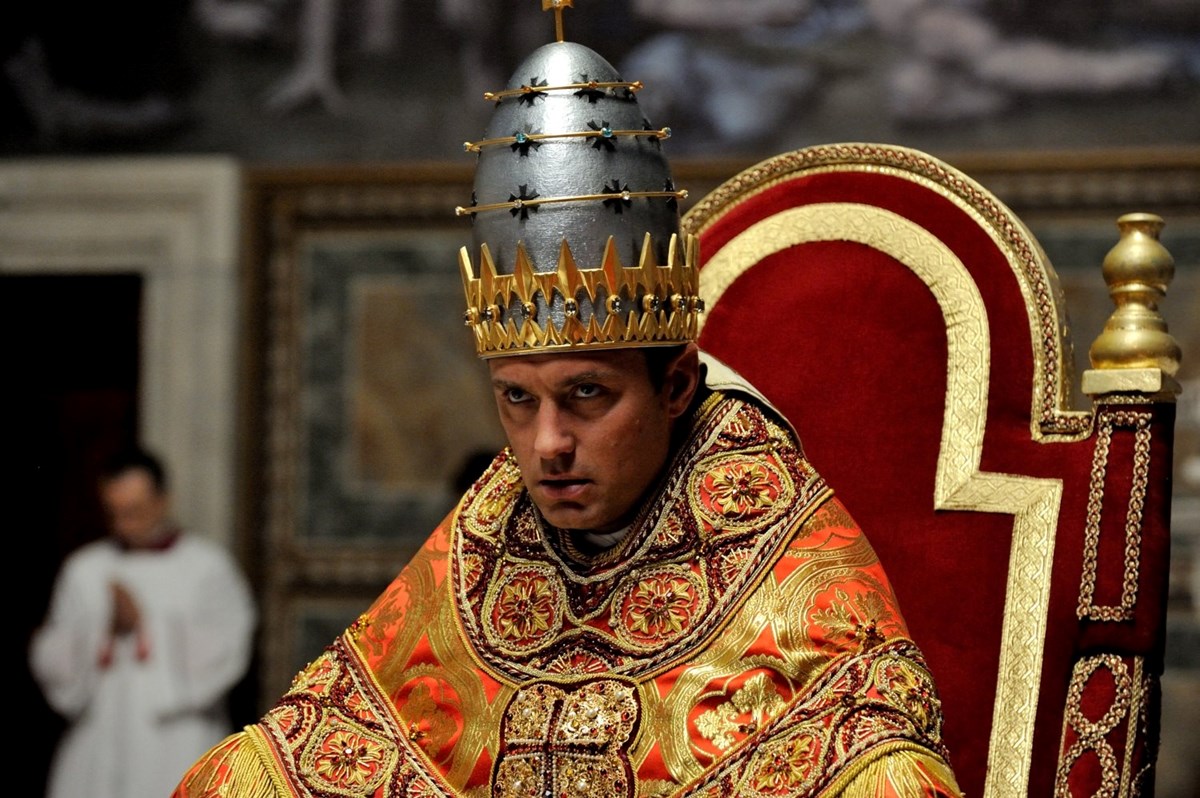My elevator pitch for HBO’s The Young Pope series is: “A show in which the Catholic version of Trump becomes Pope and tries to impose a past he never experienced and knows nothing about.”
The show is pretty interesting. And pretty weird.That’s not fully accurate but it gives the flavor. The Papal experience chronicled here is not populist but remote and revanchist. It shares the Rightist authoritarian bent that mirrors contemporary political trends in the US and Europe.
The show is pretty interesting. And pretty weird. Jude Law stars as the Pope and Diane Keaton as the nun who serves as his main consigliere. The first season runs ten episodes on HBO and has been a huge success, particularly in Italy.
It is funny in places, deeply touching in others, sometimes terrifying, often thoughtful, and, despite first appearances, it is deeply respectful of faith (this is not some send up of Catholicism). It takes a while to emerge, but the series does, in fact, have a pious heart.
However, be aware: the director is ridiculously in love with his own creativity, and so the entire thing is a tantalizing but exhausting visual spectacle in the tradition of Federico Fellini. It is also very slow moving, so you have to wait for episode 4 of 8 before anything happens to make your eyes pop out with delight. But it does eventually happen.
The scene that had me roaring with laughter was the Pope’s first address to the Cardinals in the Sistine Chapel. He becomes the first Pope to wear the full Papal Tiara in the 50 years following Paul VI’s giving it up as a symbolic homage to the poor. Having snatched back the Tiara, the new Pope arrives carried in the Papal chair and wearing the most elaborate liturgical gear I’ve ever seen (or imagined). It is so preposterous that every Cardinal in the room is left with gaping mouths.
Where Did this Guy Come From?
It’s a risky storyline to try to sell to anyone who is not intensely interested in the politics of the priesthood. An orphan from the United States (the son of hippies who run out of money) feels a calling to the priesthood at a young age and prepares for himself the perfect career. He is brilliant and beautiful, attends the right seminaries, gets high marks in everything, has all the right influences, pleases the right professors, and, following ordination, he rises through the ranks. He is priest, then pastor, then Bishop, then beloved figure in Curial circles.
Any evidence of sin gives your enemies an opportunity for blackmail.His philosophical orientation is regarded as generally conservative, but, like the best Bishops, he is oddly cagey about his personal opinions, a demeanor that invites everyone around him to suppose that he is disciplined, intelligent, prudent, and wise.
(As an aside, my friends and I used to play a game called “Bishop face,” which requires that you look forward at nothing in particular and have absolutely no expression at all and convey zero emotion: not happiness, not sadness, not even seriousness. It is much harder than you think!)
Also, this young priest is careful to keep his private life free of scandal, knowing that any evidence of sin gives your enemies an opportunity for blackmail. He is even careful about what he says in the confessional: in one scene he confesses only that “my conscience convicts me of nothing,” a brilliant statement if judged by Canon Law; it allows him to confess a general sin without confessing any particular sin.
In short, he has prepared himself perfectly for an amazing career in the Church, though it is never clear just how convinced he actually is about fundamental questions such as whether God exists.
Power Corrupts
At the next conclave to elect the new pope, in the midst of an environment of duplicitous careerism, his name emerges as a solid compromise candidate. The Left doesn’t fear him and the Right doesn’t love him, and he promises to offer the kind of face the media can celebrate: young, handsome, reliably mainstream. He is a safe choice.
No more press interviews, no more diplomacy, no more profligate forgiveness.However, once our young friend holds the keys to the kingdom of heaven, things change fast. He chooses the name Pius XIII, thus hinting at his rejection of all Church reforms since World War II (including such things as religious liberty). He refuses to be photographed, believing that this would diminish the aura of mystery that needs to surround the papacy.
It gradually emerges that he has a radical and extreme agenda, one gleaned from old books and photographs and fantasies of a world of perfect compliance and universal piety. He imposes new rules. No more press interviews, no more diplomacy, no more profligate forgiveness, and no more ordinations of any candidate for the priesthood who is morally suspect.
It’s a total crackdown.
The old timers in the Vatican are outraged at the absurdity of what he is trying to do. He imagines that he is restoring lost tradition, but he actually knows nothing about the tradition he claims to be reviving. It’s a complete invention, and the older bureaucracy in the Vatican finds the whole thing ridiculous and tedious.
Every voting member of the College of Cardinals is slapping his head: why did we vote for such a young person who is so completely untested by life experiences, so unhumbled by pastoral nuance, and untempered by the full range of Catholic history?
The unfolding drama beautifully illustrates the impossibility of recreating the past without doing violence to the emerged reality of the present. It ends up as a sharp critique of any ideology built from imagined memories of some Belle Époque not experienced by any living person. It is always and everywhere impossible to turn back the clock – and this is true in politics, economics, or even theology and Church administration. All you can really do is learn from the past, discern broadly applicable principles, and apply those principles to improving the present.
The Bureaucracy
The daily reality veers between idealism and pettiness, holiness and wicked politicking, humble service, and raw ambition.Sadly, I can’t really recommend the show simply because it is too long, too weird, and too “inside baseball” for any regular viewers. However, there is one immensely valuable takeaway that struck me: I’ve never seen a better film presentation of the real-world operations of religious bureaucracy. It verges on pathology, perhaps not as much as the film suggests, but the exaggerations are rooted in a certain reality. (Having spent an afternoon in the Vatican, I can confirm with some stories I will tell you in private at another time.)
The layers upon layers of Curial bureaucracy exist without profit-and-loss signals and clear indications of success or failure. What you have instead are thousands of highly intelligent and super dedicated people all charged with achieving a mission that once led them to the most implausible profession one can imagine in the modern world. The daily reality veers between idealism and pettiness, holiness and wicked politicking, humble service, and raw ambition, all of it unmoored to any standard of measuring achievement.
The strangeness of the situation consists in the arbitrariness of which impulse will prevail. The film captures this extremely well.
Bureaucracies Only Work In Absence of Change
All of which reminds me of an interesting passage from Ludwig von Mises’s Bureaucracy (1944), in which he describes the Catholic Church as “a perfect bureaucracy,” an opinion he offered as unironic praise. “It has successfully solved the most delicate problem of every nondemocratic government, the selection of the top executives.” It works, says Mises, precisely because the Church in its essential function is not under the obligation to change.
The realm of Christianity which the Pope and the other Bishops administer is not subject to any change. It is built upon a perennial and immutable doctrine. The creed is fixed forever. There is no progress and no evolution. There is only obedience to the law and the dogma. The methods of selection adopted by the Church are very efficient in the government of a body clinging to an undisputed, unchangeable set of rules and regulations. They are perfect in the choice of the guardians of an eternal treasure of doctrine.
However, this does not remain true under the urgency of change. It matters not whether the change is to the Right or to the Left. Any fundamental shift disrupts the very functioning of the institution itself, causing it to fall into chaos and confusion, with few positive results. This is the reason for the disruption of the Second Vatican Council (1962-1965), an event filled with hope but resulted in the inadvertent collapse in vocations and church attendance, and sowed theological and moral confusion that continues to this day.
The same problem presents itself when you attempt to go in the other direction. The result can only be more breakage. Bureaucracies do not adapt well to changing conditions; if they are going to function at all, it is only in the presence of stasis. The Young Pope puts this prophecy on display in the most phantasmagorical form ever seen on television.
It also serves as a fascinating reminder: the phrase “power corrupts” comes from Lord Acton. The target of his remark was not a statesman, but Pope Pius IX, author of the doctrine of Papal Infallibility that Acton fought with all his might. Acton taught, and we have yet to learn, that power can never be a substitute for humane rationality or dignified freedom.

